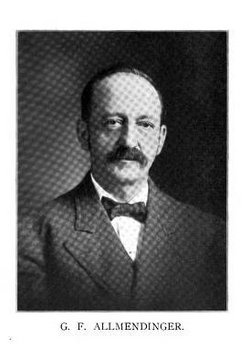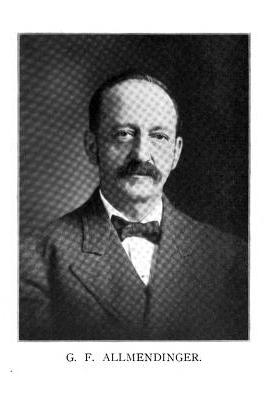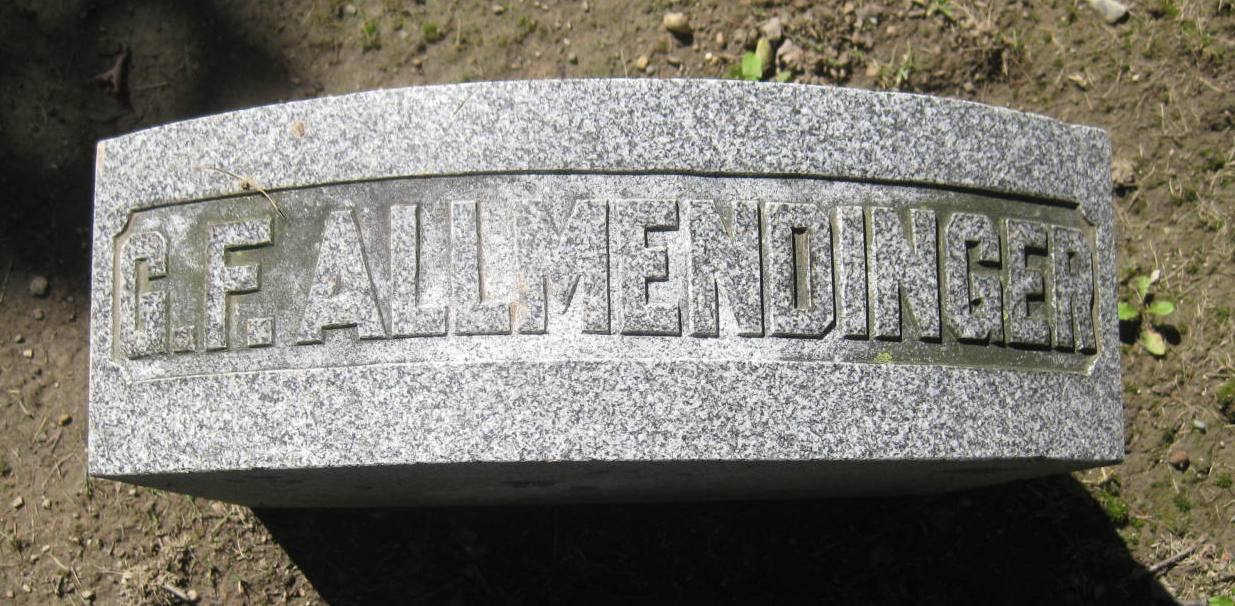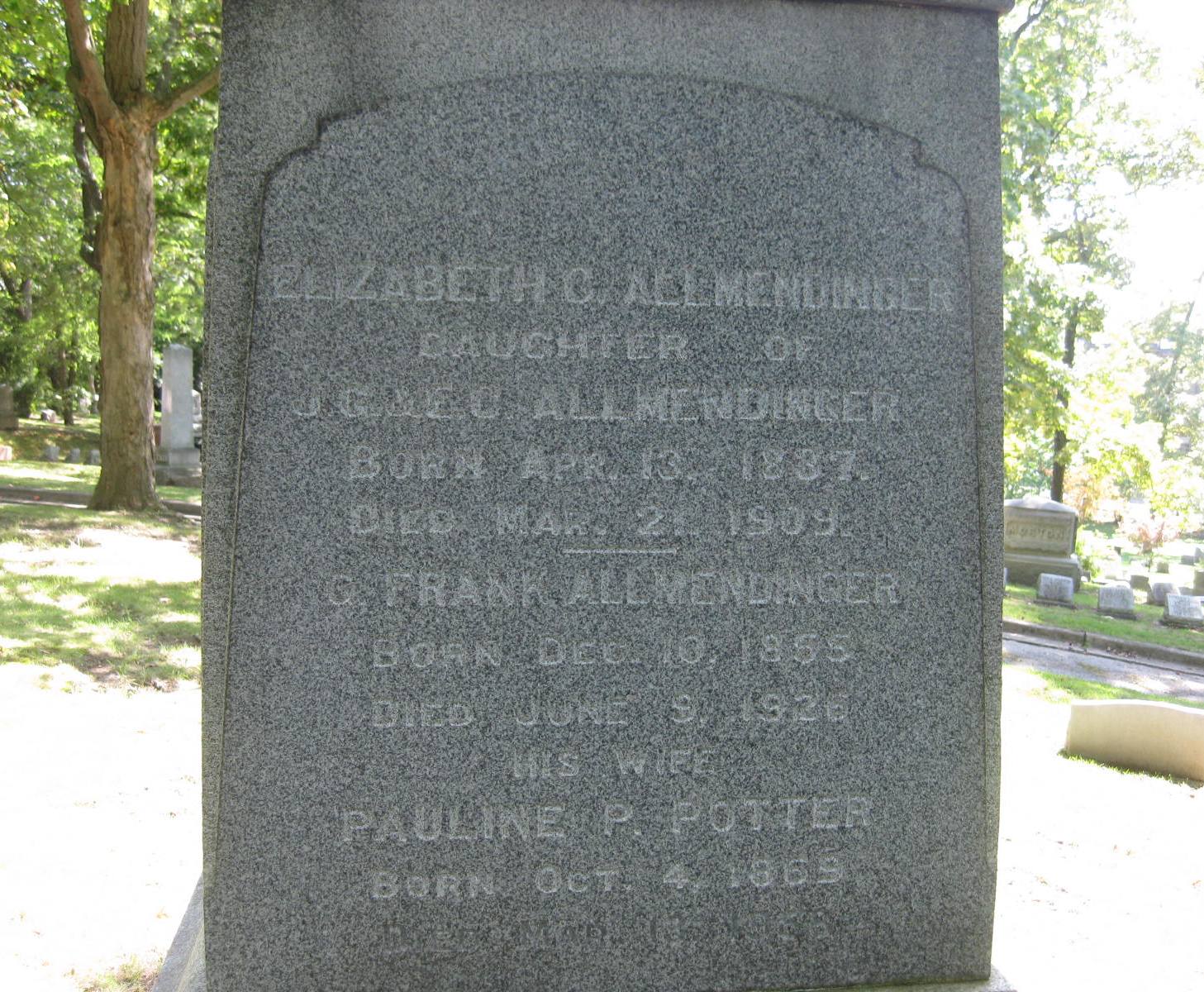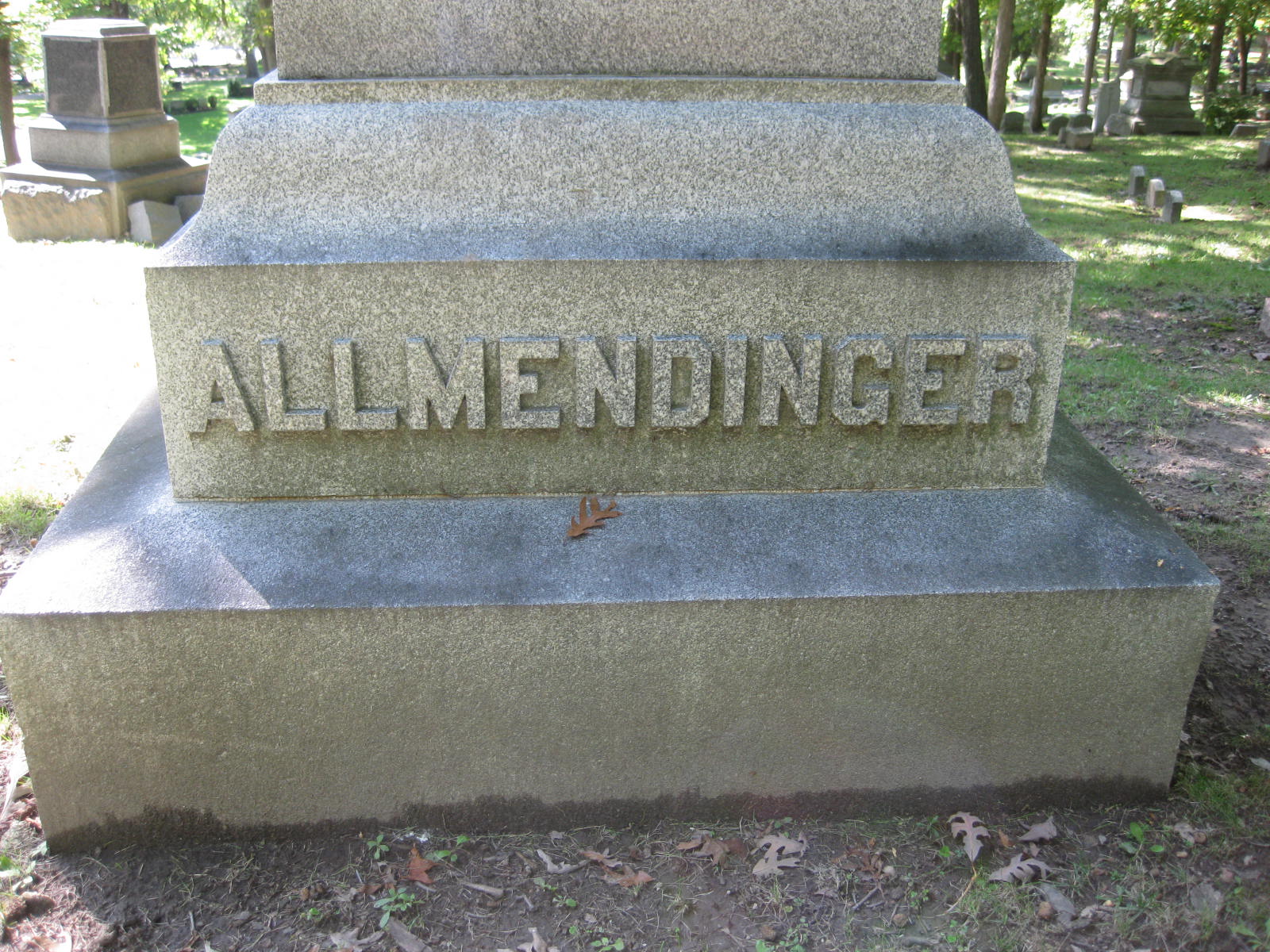Husband of Pauline P. Potter Allmendinger (m. 5 June 1912, Fenton, Genesee, MI)
^^^^^^^^^^^^^^^^^^^^^^
G.F. Allmendinger
Many departments of business activity have felt the stimulus of the co-operation and wise counsel of G. Frank Allmendinger, the secretary and treasurer of the Michigan Milling Company, one of the organizers of the Ann Arbor Organ Company and a director of the Farmers and Mechanics Bank of Ann Arbor. His labor has given impetus to these various business interests, which have proven profitable not alone to the individual stockholder but to the city at large through the promotion of commercial and industrial activity.
Mr. Allmendinger was born in Buffalo, New York, in 1855, his parents being Charles F. [Allmendinger] and Fanny (Dellenbaugh) Allmendinger. The father was born in Waiblingen near Stuttgart. Wurtemberg, Germany, Januarv 16. 1825, and came to America in 1832 with his father, John G. Allmendinger. The latter married Elizabeth C. Ilge. Charles F. Allmendinger was reared to manhood in Ann Arbor and afterward went to Buffalo, New York, where he spent the remainder of his life with the exception of three years' service in Sherman's army during the Civil war. His death occurred in Buffalo in March 1890. His wife died when their son, G. Frank Allmendinger, was only a few months old and he is the only representative of their family living in this state.
Following his mother's death and while yet an infant the subject of this review was sent to Michigan, where he was reared by his grandparents, making his home with them until their death. He afterward lived with his aunt, Mrs. Mary E. Fischer, the sister of his father, and remained with her until after he had attained his majority. He was educated in Ann Arbor and attended the University of Michigan. He graduated with the class of 1878, receiving the degree of civil engineer, but was unable to make a life work of his chosen profession because engineering work of all kinds was still nearly at a standstill as a result of the panic of 1873. His knowledge of engineering has, however, proved of constant service in the work of constructing and equipping the various plants in which he has been interested. For four years after his graduation Mr. Allmendinger was engaged in farming near Ann Arbor. In 1882 he became a member of the firm of R. K. Ailes & Company, conducting the Central Flouring Mill, which was located on South First street. Two years later Mr. Ailes retired and the firm became Allmendinger & Schneider. In 1885 this firm established the Ann Arbor Fruit Works, the predecessor of the Ann Arbor Fruit & Vinegar Company, and in 1892 they became interested in the Ann Arbor Milling Company. In 1900 the Central Milling Company and the Ann Arbor Company together with others engaged in the same line of business consolidated their interests, organizing the Michigan Milling Company, controlling all of the properties which had before been owned by individuals or the firms designated. Of the newly organized corporation Mr. Allmendinger became secretary and treasurer, which has since been his association with the business that from the beginning reached extensive proportions. He was also one of the organizers of the Ann Arbor Organ Company, his cousin, D. F. Allmendinger, the present superintendent, being the prime mover in this enterprise. Our subject is likewise a director of the Farmers and Mechanics Bank of Ann Arbor and in 1899 arid 1900 he was the president of the State Millers' Association, while for the past five years he has been the president of the State Bean Jobbers' Association.
Prominent in political circles in Washtenaw county, Mr. Allmendinger gives support to the republican party. He was a member of the city council from the first ward for four years and defeated for mayor by a vote of only two when the city give a strong majority to the opposing party. He was also a candidate for the legislature but was defeated, and he was twice elected from the seventh ward to the position of county supervisor. During his term of service in the council he was a member of the committee which prepared a new charter for the city, making possible many improvements impossible before. Electric lighting was established and the plans for the sewerage system adopted. The lawn extensions which have so beautified the city were inaugurated and the beginning of a park system made in the boulevard and Felch park. Mr. Allmendinger led the fight against the attempt made by private interests for the possession of Felch park and probably saved this ground to the city.
He was elected county supervisor for the express purpose of attacking certain bills though opposed by the men of his own party interested in them. He was sued for five thousand dollars damages for libel by an official, one of whose bills was assailed, the suit being dropped, however, before coming to trial. The suit was but an incident following the fight against the machine rule which at that time existed in Washtenaw county, and it may be added that the bill was not allowed in full nor was any retraction or apology made by the subject of this sketch. As an endorsement of his course his ward returned him to the board the following year without opposition. He has for the last twelve years been active in city and county affairs, is strongly opposed to misrule and is an advocate of honest politics everywhere.
Mr. Allmendinger has been a member of the board of directors of the University School of Music and chairman of its finance committee since its inception in 1892. He holds a similar position on the governing body of the Students' Christian Association of the University of Michigan. He is one of the trustees of the Congregational church and has been identified with various other organizations.
Mr. Allmendinger makes his home with his aunt, Elizabeth C. Allmendinger, who is the oldest living representative, but one of this family, prominent in the pioneer history of the county and the only survivor of a large family of brothers and sisters. She was born in Ann Arbor in 1837 and this city has been her home. For two years after the Civil war she was a teacher of freedmen in the south. She later became instructor in botany in the Ann Arbor high school, and under the direction of Professor M. W. Harrington of the University of Michigan, she assisted in the arrangement of the university herbarium. Her list of flora of Washtenaw county was published in 1881 and embraced three hundred and eighty-one genera and eight hundred and fifty species. This indicates a wonderful variety of plants in this county. Dr. Asa Gray in his botany of the northern states gives one hundred and thirty orders. In Washtenaw county one hundred and one are represented, leaving only twenty-nine without representation.
Miss Allmendinger has been connected with the Congregational church for many years, and is a member of the Woman's Relief Corps. At the time of the Civil war she was very active in preparing supplies for the sick and wounded, and has been a most worthy woman, whose life has been a helpful one and who has thereby endeared herself to many friends.
Source: Past and Present of Washtenaw County, Michigan, by Samuel Willard Beakes, S.J. Clarke Publishing Co., Chicago, IL, 1906, pp 216-219
Husband of Pauline P. Potter Allmendinger (m. 5 June 1912, Fenton, Genesee, MI)
^^^^^^^^^^^^^^^^^^^^^^
G.F. Allmendinger
Many departments of business activity have felt the stimulus of the co-operation and wise counsel of G. Frank Allmendinger, the secretary and treasurer of the Michigan Milling Company, one of the organizers of the Ann Arbor Organ Company and a director of the Farmers and Mechanics Bank of Ann Arbor. His labor has given impetus to these various business interests, which have proven profitable not alone to the individual stockholder but to the city at large through the promotion of commercial and industrial activity.
Mr. Allmendinger was born in Buffalo, New York, in 1855, his parents being Charles F. [Allmendinger] and Fanny (Dellenbaugh) Allmendinger. The father was born in Waiblingen near Stuttgart. Wurtemberg, Germany, Januarv 16. 1825, and came to America in 1832 with his father, John G. Allmendinger. The latter married Elizabeth C. Ilge. Charles F. Allmendinger was reared to manhood in Ann Arbor and afterward went to Buffalo, New York, where he spent the remainder of his life with the exception of three years' service in Sherman's army during the Civil war. His death occurred in Buffalo in March 1890. His wife died when their son, G. Frank Allmendinger, was only a few months old and he is the only representative of their family living in this state.
Following his mother's death and while yet an infant the subject of this review was sent to Michigan, where he was reared by his grandparents, making his home with them until their death. He afterward lived with his aunt, Mrs. Mary E. Fischer, the sister of his father, and remained with her until after he had attained his majority. He was educated in Ann Arbor and attended the University of Michigan. He graduated with the class of 1878, receiving the degree of civil engineer, but was unable to make a life work of his chosen profession because engineering work of all kinds was still nearly at a standstill as a result of the panic of 1873. His knowledge of engineering has, however, proved of constant service in the work of constructing and equipping the various plants in which he has been interested. For four years after his graduation Mr. Allmendinger was engaged in farming near Ann Arbor. In 1882 he became a member of the firm of R. K. Ailes & Company, conducting the Central Flouring Mill, which was located on South First street. Two years later Mr. Ailes retired and the firm became Allmendinger & Schneider. In 1885 this firm established the Ann Arbor Fruit Works, the predecessor of the Ann Arbor Fruit & Vinegar Company, and in 1892 they became interested in the Ann Arbor Milling Company. In 1900 the Central Milling Company and the Ann Arbor Company together with others engaged in the same line of business consolidated their interests, organizing the Michigan Milling Company, controlling all of the properties which had before been owned by individuals or the firms designated. Of the newly organized corporation Mr. Allmendinger became secretary and treasurer, which has since been his association with the business that from the beginning reached extensive proportions. He was also one of the organizers of the Ann Arbor Organ Company, his cousin, D. F. Allmendinger, the present superintendent, being the prime mover in this enterprise. Our subject is likewise a director of the Farmers and Mechanics Bank of Ann Arbor and in 1899 arid 1900 he was the president of the State Millers' Association, while for the past five years he has been the president of the State Bean Jobbers' Association.
Prominent in political circles in Washtenaw county, Mr. Allmendinger gives support to the republican party. He was a member of the city council from the first ward for four years and defeated for mayor by a vote of only two when the city give a strong majority to the opposing party. He was also a candidate for the legislature but was defeated, and he was twice elected from the seventh ward to the position of county supervisor. During his term of service in the council he was a member of the committee which prepared a new charter for the city, making possible many improvements impossible before. Electric lighting was established and the plans for the sewerage system adopted. The lawn extensions which have so beautified the city were inaugurated and the beginning of a park system made in the boulevard and Felch park. Mr. Allmendinger led the fight against the attempt made by private interests for the possession of Felch park and probably saved this ground to the city.
He was elected county supervisor for the express purpose of attacking certain bills though opposed by the men of his own party interested in them. He was sued for five thousand dollars damages for libel by an official, one of whose bills was assailed, the suit being dropped, however, before coming to trial. The suit was but an incident following the fight against the machine rule which at that time existed in Washtenaw county, and it may be added that the bill was not allowed in full nor was any retraction or apology made by the subject of this sketch. As an endorsement of his course his ward returned him to the board the following year without opposition. He has for the last twelve years been active in city and county affairs, is strongly opposed to misrule and is an advocate of honest politics everywhere.
Mr. Allmendinger has been a member of the board of directors of the University School of Music and chairman of its finance committee since its inception in 1892. He holds a similar position on the governing body of the Students' Christian Association of the University of Michigan. He is one of the trustees of the Congregational church and has been identified with various other organizations.
Mr. Allmendinger makes his home with his aunt, Elizabeth C. Allmendinger, who is the oldest living representative, but one of this family, prominent in the pioneer history of the county and the only survivor of a large family of brothers and sisters. She was born in Ann Arbor in 1837 and this city has been her home. For two years after the Civil war she was a teacher of freedmen in the south. She later became instructor in botany in the Ann Arbor high school, and under the direction of Professor M. W. Harrington of the University of Michigan, she assisted in the arrangement of the university herbarium. Her list of flora of Washtenaw county was published in 1881 and embraced three hundred and eighty-one genera and eight hundred and fifty species. This indicates a wonderful variety of plants in this county. Dr. Asa Gray in his botany of the northern states gives one hundred and thirty orders. In Washtenaw county one hundred and one are represented, leaving only twenty-nine without representation.
Miss Allmendinger has been connected with the Congregational church for many years, and is a member of the Woman's Relief Corps. At the time of the Civil war she was very active in preparing supplies for the sick and wounded, and has been a most worthy woman, whose life has been a helpful one and who has thereby endeared herself to many friends.
Source: Past and Present of Washtenaw County, Michigan, by Samuel Willard Beakes, S.J. Clarke Publishing Co., Chicago, IL, 1906, pp 216-219
Family Members
Sponsored by Ancestry
Advertisement
Explore more
Sponsored by Ancestry
Advertisement
